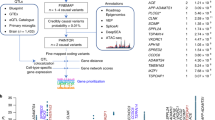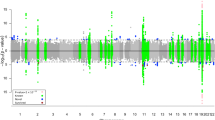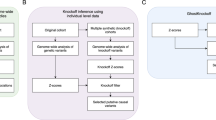Abstract
Growing evidence from both epidemiology and basic science suggest an inverse association between Alzheimer’s disease (AD) and cancer. We examined the genetic relationship between AD and various cancer types using GWAS summary statistics from the IGAP and GAME-ON consortia. Sample size ranged from 9931 to 54,162; SNPs were imputed to the 1000 Genomes European panel. Our results based on cross-trait LD Score regression showed a significant positive genetic correlation between AD and five cancers combined (colon, breast, prostate, ovarian, lung; r g = 0.17, P = 0.04), and specifically with breast cancer (ER-negative and overall; r g = 0.21 and 0.18, P = 0.035 and 0.034) and lung cancer (adenocarcinoma, squamous cell carcinoma and overall; r g = 0.31, 0.38 and 0.30, P = 0.029, 0.016, and 0.006). Estimating the genetic correlation in specific functional categories revealed mixed positive and negative signals, notably stronger at annotations associated with increased enhancer activity. This suggests a role of gene expression regulators in the shared genetic etiology between AD and cancer, and that some shared variants modulate disease risk concordantly while others have effects in opposite directions. Due to power issues, we did not detect cross-phenotype associations at individual SNPs. This genetic overlap is not likely driven by a handful of major loci. Our study is the first to examine the co-heritability of AD and cancer leveraging large-scale GWAS results. The functional categories highlighted in this study need further investigation to illustrate the details of the genetic sharing and to bridge between different levels of associations.



Similar content being viewed by others
References
Bao L, Kimzey A, Sauter G, Sowadski JM, Lu KP, Wang DG (2004) Prevalent overexpression of prolyl isomerase Pin1 in human cancers. Am J Pathol 164:1727–1737. doi:10.1016/S0002-9440(10)63731-5
Brookmeyer R, Johnson E, Ziegler-Graham K, Arrighi HM (2007) Forecasting the global burden of Alzheimer’s disease. Alzheimers Dement 3:186–191. doi:10.1016/j.jalz.2007.04.381
Bulik-Sullivan B et al (2015a) An atlas of genetic correlations across human diseases and traits. Nat Genet 47:1236–1241. doi:10.1038/ng.3406
Bulik-Sullivan BK et al (2015b) LD Score regression distinguishes confounding from polygenicity in genome-wide association studies. Nat Genet 47:291–295. doi:10.1038/ng.3211
Catala-Lopez F, Crespo-Facorro B, Vieta E, Valderas JM, Valencia A, Tabares-Seisdedos R (2014) Alzheimer’s disease and cancer: current epidemiological evidence for a mutual protection. Neuroepidemiology 42(2):121–122. doi:10.1159/000355899 (Epub 2014 Jan 3)
Cotsapas C et al (2011) Pervasive sharing of genetic effects in autoimmune disease. PLoS Genet 7:e1002254. doi:10.1371/journal.pgen.1002254
Cross-disorder group of the psychiatric genomics C (2013) Identification of risk loci with shared effects on five major psychiatric disorders: a genome-wide analysis. Lancet 381:1371–1379. doi:10.1016/S0140-6736(12)62129-1
Demetrius LA, Simon DK (2013) The inverse association of cancer and Alzheimer’s: a bioenergetic mechanism. J R Soc Interface 10:20130006. doi:10.1098/rsif.2013.0006
Driver JA et al (2012) Inverse association between cancer and Alzheimer’s disease: results from the Framingham Heart Study. Bmj 344:e1442. doi:10.1136/bmj.e1442
Finucane HK et al (2015) Partitioning heritability by functional annotation using genome-wide association summary statistics. Nat Genet 47:1228–1235. doi:10.1038/ng.3404
Gusev A et al (2014) Partitioning heritability of regulatory and cell-type-specific variants across 11 common diseases. Am J Hum Genet 95:535–552. doi:10.1016/j.ajhg.2014.10.004
Hanahan D, Weinberg RA (2011) Hallmarks of cancer: the next generation. Cell 144:646–674. doi:10.1016/j.cell.2011.02.013
Holohan KN, Lahiri DK, Schneider BP, Foroud T, Saykin AJ (2012) Functional microRNAs in Alzheimer’s disease and cancer: differential regulation of common mechanisms and pathways. Front Genet 3:323. doi:10.3389/fgene.2012.00323
Hung RJ et al (2008) A susceptibility locus for lung cancer maps to nicotinic acetylcholine receptor subunit genes on 15q25. Nature 452:633–637. doi:10.1038/nature06885
Ibanez K, Boullosa C, Tabares-Seisdedos R, Baudot A, Valencia A (2014) Molecular evidence for the inverse comorbidity between central nervous system disorders and cancers detected by transcriptomic meta-analyses. PLoS Genet 10:e1004173. doi:10.1371/journal.pgen.1004173
Inestrosa NC, Toledo EM (2008) The role of Wnt signaling in neuronal dysfunction in Alzheimer’s disease. Mol Neurodegener 3:9. doi:10.1186/1750-1326-3-9
Lambert JC et al (2013) Meta-analysis of 74,046 individuals identifies 11 new susceptibility loci for Alzheimer’s disease. Nat Genet 45:1452–1458
Lee SH, Yang J, Goddard ME, Visscher PM, Wray NR (2012) Estimation of pleiotropy between complex diseases using single-nucleotide polymorphism-derived genomic relationships and restricted maximum likelihood. Bioinformatics 28:2540–2542. doi:10.1093/bioinformatics/bts474
Lopez AD, Mathers CD, Ezzati M, Jamison DT, Murray CJ (2006) Global and regional burden of disease and risk factors, 2001: systematic analysis of population health data. Lancet 367:1747–1757. doi:10.1016/S0140-6736(06)68770-9
Musicco M et al (2013) Inverse occurrence of cancer and Alzheimer disease: a population-based incidence study. Neurology 81:322–328. doi:10.1212/WNL.0b013e31829c5ec1
Nudelman KN, Risacher SL, West JD, McDonald BC, Gao S, Saykin AJ, Alzheimer’s Disease Neuroimaging I (2014) Association of cancer history with Alzheimer’s disease onset and structural brain changes. Front Physiol 5:423. doi:10.3389/fphys.2014.00423
Pickrell JK, Berisa T, Liu JZ, Segurel L, Tung JY, Hinds DA (2016) Detection and interpretation of shared genetic influences on 42 human traits. Nat Genet 48:709–717. doi:10.1038/ng.3570
Purcell SM, Wray NR, Stone JL, Visscher PM, O’Donovan MC, Sullivan PF, Sklar P (2009) Common polygenic variation contributes to risk of schizophrenia and bipolar disorder. Nature 460:748–752
Realmuto S et al (2012) Tumor diagnosis preceding Alzheimer’s disease onset: is there a link between cancer and Alzheimer’s disease? J Alzheimers Dis 31:177–182. doi:10.3233/JAD-2012-120184
Roe CM, Behrens MI, Xiong C, Miller JP, Morris JC (2005) Alzheimer disease and cancer. Neurology 64:895–898. doi:10.1212/01.WNL.0000152889.94785.51
Roe CM et al (2010) Cancer linked to Alzheimer disease but not vascular dementia. Neurology 74:106–112. doi:10.1212/WNL.0b013e3181c91873
Tabares-Seisdedos R, Rubenstein JL (2013) Inverse cancer comorbidity: a serendipitous opportunity to gain insight into CNS disorders. Nat Rev Neurosci 14:293–304. doi:10.1038/nrn3464
Thun MJ, DeLancey JO, Center MM, Jemal A, Ward EM (2010) The global burden of cancer: priorities for prevention. Carcinogenesis 31:100–110. doi:10.1093/carcin/bgp263
van Heemst D et al (2005) Variation in the human TP53 gene affects old age survival and cancer mortality. Exp Gerontol 40:11–15
Visscher PM et al (2014) Statistical power to detect genetic (co)variance of complex traits using SNP data in unrelated samples. PLoS Genet 10:e1004269. doi:10.1371/journal.pgen.1004269
Willer CJ, Li Y, Abecasis GR (2010) METAL: fast and efficient meta-analysis of genome-wide association scans. Bioinformatics 26:2190–2191. doi:10.1093/bioinformatics/btq340
Yang J, Lee SH, Goddard ME, Visscher PM (2011) GCTA: a tool for genome-wide complex trait analysis. Am J Hum Genet 88:76–82. doi:10.1016/j.ajhg.2010.11.011
Acknowledgements
We thank the International Genomics of Alzheimer’s Project (IGAP) and the GAME-ON network for providing summary results data for these analyses. The investigators within IGAP contributed to the design and implementation of IGAP and/or provided data but did not participate in analysis or writing of this report. IGAP was made possible by the generous participation of the control subjects, the patients, and their families. The i–Select chip was funded by the French National Foundation on Alzheimer’s disease and related disorders. EADI was supported by the LABEX (laboratory of excellence program investment for the future) DISTALZ grant, Inserm, Institut Pasteur de Lille, Université de Lille 2 and the Lille University Hospital. GERAD was supported by the Medical Research Council (Grant No. 503480), Alzheimer’s Research UK (Grant No. 503176), the Wellcome Trust (Grant No. 082604/2/07/Z) and German Federal Ministry of Education and Research (BMBF): Competence Network Dementia (CND) Grant No. 01GI0102, 01GI0711, 01GI0420. CHARGE was partly supported by the NIH/NIA grant R01 AG033193 and the NIA AG081220 and AGES contract N01–AG–12100, the NHLBI grant R01 HL105756, the Icelandic Heart Association, and the Erasmus Medical Center and Erasmus University. ADGC was supported by the NIH/NIA Grants: U01 AG032984, U24 AG021886, U01 AG016976, and the Alzheimer’s Association Grant ADGC–10–196728. We also thank members of individual studies from the GAME-ON network whose tremendous efforts altogether made this work possible:
Members of CORECT: CORECT acknowledges the following investigators: Kendra Blalock, Peter T. Campbell, Graham Casey, David V. Conti, Christopher K. Edlund, Jane Figueiredo, W. James Gauderman, Jian Gong, Roger C. Green, Stephen B. Gruber, John F. Harju, Tabitha A. Harrison, Eric J. Jacobs, Mark A. Jenkins, Shuo Jiao, Li Li, Yi Lin, Frank J. Manion, Victor Moreno, Bhramar Mukherjee, Ulrike Peters, Leon Raskin, Fredrick R. Schumacher, Daniela Seminara, Gianluca Severi, Stephanie L. Stenzel, and Duncan C. Thomas.
Members of DRIVE: DRIVE acknowledges the following GWASs and investigators that shared genome-wide summary data as part of the breast cancer GWAS meta-analysis: the Australian Breast Cancer Family Study (ABCFS) (John L. Hopper, Melissa C. Southey, Enes Makalic, Daniel F. Schmidt), the British Breast Cancer Study (BBCS) (Olivia Fletcher, Julian Peto, Lorna Gibson, Isabel dos Santos Silva), the Breast and Prostate Cancer Cohort Consortium (BPC3) (David J. Hunter, Sara Lindström, Peter Kraft), the Breast Cancer Family Registries (BCFR) (Habib Ahsan, Alice Whittemore), the Dutch Familial Bilateral Breast Cancer Study (DFBBCS) (Quinten Waisfisz, Hanne Meijers-Heijboer, Muriel Adank, Rob B. van der Luijt, Andre G. Uitterlinden, Albert Hofman), German Consortium for Hereditary Breast and Ovarian Cancer (GC-HBOC) (Alfons Meindl, Rita K. Schmutzler, Bertram Müller-Myhsok, Peter Lichtner), the Helsinki Breast Cancer Study (HEBCS) (Heli Nevanlinna, Taru A. Muranen, Kristiina Aittomäki, Carl Blomqvist), the Mammary Carcinoma Risk Factor Investigation (MARIE) (Jenny Chang-Claude, Rebecca Hein, Norbert Dahmen, Lars Beckman), SardiNIA (Laura Crisponi), the Singapore and Sweden Breast Cancer Study (SASBAC) (Per Hall, Kamila Czene, Astrid Irwanto, Jianjun Liu), and the UK2 (Douglas F. Easton, Clare Turnbull, and Nazneen Rahman).
Members of ELLIPSE: ELLIPSE acknowledges the following GWASs and investigators that shared genome-wide summary data as part of the prostate cancer GWAS meta-analysis: CRUK (Rosalind Eeles, Douglas F. Easton, Zsofia Kote-Jarai, Kenneth Muir, Graham Giles, Gianluca Severi, David Neal, Jenny L. Donovan, Freddie C. Hamdy), CAPS1 and CAPS2 (Fredrik Wiklund, Henrik Gronberg), BPC3-MEC (Christopher Haiman, Fred Schumacher), BPC3-EPIC (Ruth Travis, Elio Riboli), BPC3-Harvard (Peter Kraft, David Hunter), BPC3-ACS (Susan Gapstur), and PEGASUS (Sonja Berndt, Stephen Chanock).
Members of TRICL: TRICL acknowledges the following investigators: Younghun Han, Li Su, Yongyue Wei, Rayjean J. Hung, Yonathan Brhane, John McLaughlin, Paul Brennan, James D. McKay, Heike Bickeböller, Albert Rosenberger, Richard S. Houlston, Neil Caporaso, Maria Teresa Landi, Joachim Heinrich, Angela Risch, Xifeng Wu, Yuanqing Ye, David C. Christiani, and Christopher I. Amos.
Author information
Authors and Affiliations
Consortia
Corresponding author
Ethics declarations
Funding
This research was funded by the US Department of Veterans Affairs Merit Award Grant Clinical Science R&D [I01CX000934-01A1] (PI:Driver). The Genetic Association and Mechanisms in Oncology (GAME-ON) network was supported by the National Institutes of Health [U19CA148065 (DRIVE), U19CA148107 (CORECT), U19CA148127 (TRICL), and U19CA148537 (ELLIPSE)].
Conflict of interest
The authors declare that they have no conflicts of interest.
Additional information
The members of the IGAP Consortium, Colorectal Transdisciplinary Study (CORECT), Discovery, Biology, and Risk of Inherited Variants in Breast Cancer (DRIVE), Elucidating Loci Involved in Prostate Cancer Susceptibility (ELLIPSE), Transdisciplinary Research in Cancer of the Lung (TRICL) teams are provided in the Acknowledgements section.
Electronic supplementary material
Below is the link to the electronic supplementary material.
Rights and permissions
About this article
Cite this article
Feng, YC.A., Cho, K., Lindstrom, S. et al. Investigating the genetic relationship between Alzheimer’s disease and cancer using GWAS summary statistics. Hum Genet 136, 1341–1351 (2017). https://doi.org/10.1007/s00439-017-1831-6
Received:
Accepted:
Published:
Issue Date:
DOI: https://doi.org/10.1007/s00439-017-1831-6




